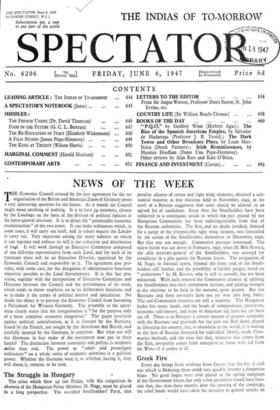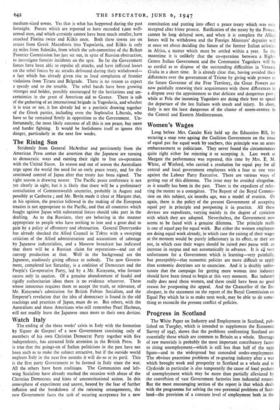Greek Fire
Every day brings fresh evidence from Greece that the fire of civil war which is flickering there could very quickly become a dangerous blaze. No great hopes wen: ever placed in the spring campaign of the Government forces, but only a few pessimists would have fore-. cast that, less than three months after the opening of the campaign, the rebel bands would have taken the initiative in general attacks on medium-sized towns. Yet that is what has happened during the past fortnight. Forces which are reported to have exceeded i,000 well- armed men, and which certainly cannot have been much smaller, have attacked Florina twice and Kilkis once. Both these towns are on routes from Greek Macedonia into Yugoslavia, and Kilkis is only 25 miles from Salonika, from which the sub-committee of the Ballip Frontier Commission has just set out, in spite of Russian obstruction, to investigate frontier incidents on the spot. So far the Government forces have been ablz to repulse all attacks, and have inflicted losses on the rebel forces by air attacks delivered during their withdrawal— a fact which has already given rise to loud complaints of frontier violations from Tirana and Belgrade. There is no reason to expect a speedy end to the trouble. The rebel bar.ds have been growing stronger and bolder, possibly encouraged by the hesitations and un- certainties in the grant of American aid to Greece. There is talk of the gathering of an international brigade in Yugoslavia, and whether it is true or not, it has already led to a patriotic drawing together of the Greek parties, including even the Sophoulist Liberals, who have so far remained firmly in opposition to the Government. Un- fortunately, the most likely outcome of all this is not peace, but more and harder fighting. It would be foolishness itself to ignore this clinger, particularly in the next few weeks.



































 Previous page
Previous page